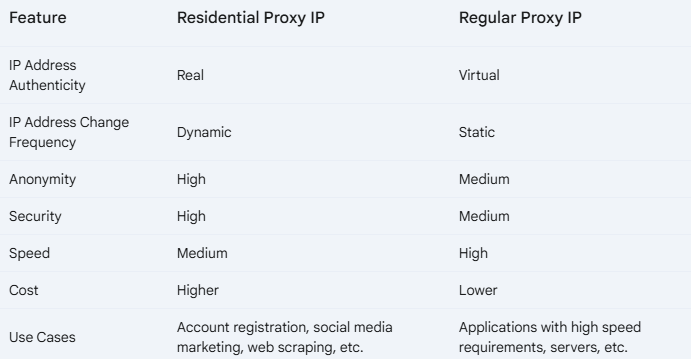In the online world, proxy IP plays an increasingly important role. It can help us hide our real IP address, break through network restrictions, increase access speed, etc. However, there are many types of proxy IPs, among which dynamic residential IP and ordinary proxy IP are two common types. This article will explore the difference between dynamic residential IP and ordinary proxy IP in depth, help you better understand these two proxy IPs, and choose the type of proxy IP that suits you.

What is a dynamic residential IP?
Dynamic residential IP, as the name suggests, refers to a residential IP whose IP address changes dynamically. This type of IP address is usually assigned to home broadband users by ISPs (Internet service providers). The characteristics of dynamic residential IP are:
- Authenticity: Dynamic residential IP is a real home broadband IP address, which is no different from the IP address of ordinary users, so it is more difficult to be identified as a proxy IP by the target website.
- Security: Since the IP address changes dynamically, it is difficult for hackers or malicious users to track the real IP address, thereby improving security.
- Anonymity: Dynamic residential IP can better hide the user's true identity and protect user privacy.
What is a normal proxy IP?
Normal proxy IP, also known as data center IP, refers to the IP address provided by the data center. This IP address is usually used for servers or corporate networks. The characteristics of a normal proxy IP are:
- Stability: The IP address of a normal proxy IP is usually fixed and does not change frequently.
- Speed: Normal proxy IPs usually have higher bandwidth and speed, suitable for applications that require high-speed network connections.
- Cost: The cost of a normal proxy IP is usually lower, suitable for users with limited budgets.
The difference between dynamic residential IP and normal proxy IP

How to choose a proxy IP that suits you?
To choose a proxy IP that suits you, you need to consider the following factors:
- Application scenario: If you need to register an account, social media marketing, web crawlers, and other applications that require high IP address authenticity, it is recommended to choose a dynamic residential IP. If you need to access applications with high speed requirements, such as online games, video playback, etc., you can choose a normal proxy IP.
- Budget: The cost of a dynamic residential IP is usually high. If your budget is limited, you can choose a normal proxy IP.
- Security: If you have high security requirements, it is recommended to choose a dynamic residential IP.
- Anonymity: If you need higher anonymity, it is recommended to choose a dynamic residential IP.
98IP Proxy IP: Your Reliable Choice
Whether you choose a dynamic residential IP or a normal proxy IP, it is crucial to choose a reliable proxy IP service provider. 98IP Proxy IP is a well-known proxy IP service provider that provides stable, fast, and secure proxy IP services. 98IP has server nodes all over the world to meet your various needs.
Summary
Dynamic residential IP and ordinary proxy IP each have their own advantages and disadvantages. Which type of proxy IP to choose depends on your specific needs. I hope this article can help you better understand these two types of proxy IPs and choose the type of proxy IP that suits you.
Related Recommendations
- How to prevent overseas social media matrix connections through IP proxies?
- How to change the IP address?
- What are the reasons for HTTP failure? How to handle it?
- How to channel cross-border e-commerce platforms and unlock global traffic passwords?
- In-depth analysis: Obtaining and applying foreign IP proxy addresses
- The future is here: Pure IP guides new trends in Internet development
- Python3 Selenium enables efficient configuration of Chrome proxy IP
- How to play overseas social media marketing platforms?
- How to restore the proxy server? Teach you to quickly restore a stable connection
- How to check the country or region where the TikTok account IP is located?

